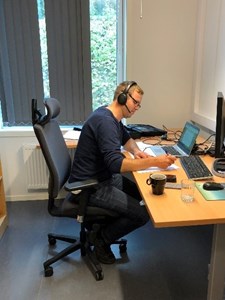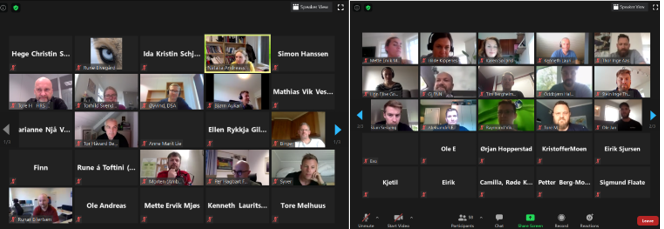Exercise scenario
The purpose of the exercise was to provide the students gain a better understanding on Norwegian nuclear safety preparedness, as well as discuss roles, responsibilities and cooperation between agencies that will be involved in case of a nuclear accident at sea.
The increase in traffic of nuclear-powered ships along the Norwegian coastline makes this scenario particularly relevant. Participants learned a lot about Norwegian maritime nuclear safety preparedness and talked about how organizations and agencies respond to such crises through all management levels, including the strategic level.
The scenario of the nuclear exercise is based on a scenario developed by the Directorate for Radiation Protection and Nuclear Safety (DSA) and the Joint Rescue Coordination Center Northern Norway (JRCC NN). This scenario was based on RADSAR and ARCSAFE projects at the Arctic Council's Emergency Preparedness, Prevention and Response Working Group (EPPR). EPPR established the Radiation Expert Group, RAD EG, with a special focus on facilitation and a strategic planning framework for radiological and nuclear emergencies in the Arctic.
In 2019, the expert group conducted an international TTX for delegations in EPPR with a similar scenario. University of the Arctic (UArctic) has an official observer status at the Arctic Council. The UArctic Thematic Network on Arctic Safety and Security led by Nord university has such an observer status in the Arctic Council's EPPR Working Group.
The «Nuclear emergency Preparedness exercise-2020» design, concept and learning outcomes were developed for the students in the Master in Preparedness and Emergency Management program at Nord University Business School (MASIK). It was developed by program coordinator and Associate Professor Natalia Andreassen and senior adviser at NORDLAB Rune Elvegård, in cooperation with Øyvind Aas-Hansen, senior adviser at DSA, and Tore Hongset, rescue controller at JRCC NN.

Øyvind Aas-Hansen represents the head of the Radiation Expert Group in the EPPR Working Group of Arctic Council. Tore Hongset represents Norwegian delegation both in the Radiation Expert Group and SAR Expert Group in EPPR. Both visited us at the High North Centre and participated as mentors in the exercise. They are both experts on the organization for nuclear safety and security and how responsibility is divided between the rescue services and key agencies during a maritime nuclear emergency.
Nord University continues to focus on realistic and urgent research issues in the Arctic region. This is done via the observer status in the UArctic network, as well as through research at the High North Center on training and education concepts in maritime emergency preparedness, emergency response management and crisis management exercises. This is facilitated by the emergency preparedness management laboratory NORDLAB.
About Digital TTX concept
A tabletop exercise (TTX) is a discussion-based exercise widely practiced at strategic, operational and tactical levels of emergency management. This kind of exercise can be used by a whole organization, or parts of it. It can also be used as a collaborative exercise between several organizations. Through dialogue and discussion, participants gain a greater understanding of their own role, as well as the roles of the other participants. They also become knowledgeable about responsibilities and how communication lines within Norwegian authorities function during a particular scenario, as well as possible outcomes of these scenarios.
The Digital TTX concept uses various digital educational tools available for the participants, which puts the learning from theory and into practice. This TTX was conducted digitally via the Zoom video conference platform. Digital platforms make it possible to involve students from other universities and institutions, both Norway and abroad. This is of great importance when it comes to the digitalization of our society.

The feedback from the students after the exercise was very positive. Many participants were not familiar with the digital platform, but they felt it was well structured and organized.
– It was new for me to use a platform like Zoom in such an exercise, but I think that it went beyond all expectations. Although it certainly would have been both fun and easier to be physically in the same room with the whole group, was among the feedback we received.
The students have been forced to complete the autumn semester digitally. Mostly because of the Covid-19 restrictions, but also because several of the students have jobs within critical public organisations.
About the participants
58 students at the experience-based programme “Master in Preparedness and Emergency Management” at Nord University Business School participated in the “Nuclear Emergency Preparedness Exercise 2020”. The master programme is aimed at leaders at all levels and others who participate in security and emergency response work in both the public and private sectors, as well as professionals working within the emergency response system, both at the tactical, operational and strategic levels.
All the students have a background from emergency and response organisations like Police, Armed Forces, Coast Guard, fire and rescue service, the health sector, private companies and other government agencies. An important purpose of the master programme is to establish platforms and a network for sharing knowledge and experience between these organisations, as well as with academic institutions.
The programme also make it easy for the students to exchange experiences and learn from each other, since their expertise depends on what kind of jobs they have.
As one student said:
– It is very exciting since there’s so much expertise from both the mentors and from the different professional sectors within the group.
For more information:
Natalia Andreassen
natalia.andreassen@nord.no
